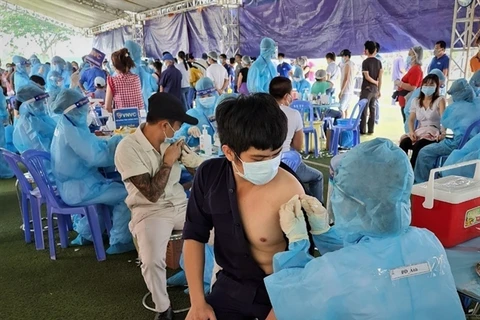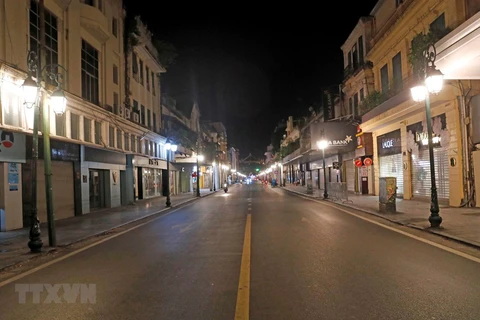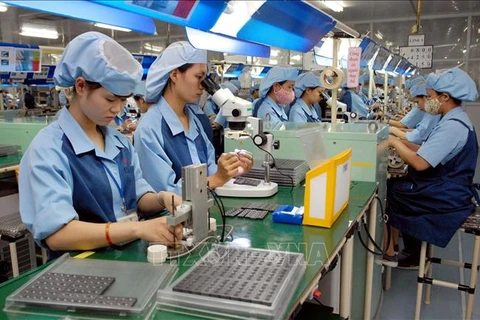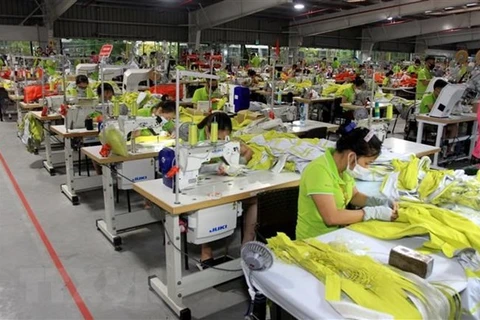Hanoi (VNA) – While Vietnamese enterprises have made many changes to adapt to difficulties caused by the COVID-19 pandemic, the rigid application of pandemic prevention and control measures might drive away foreign investment from Vietnam, experts have warned.
According to To Hoai Nam, Vice President and General Secretary of the Vietnam Association of Small and Medium Enterprises (VINASME), many businesses have organised rotational shifts for employees to minimise absence and leave no one behind. They applied cost-saving measures by adjusting personnel towards concentration and giving priority to positions generating direct revenues and created conditions for some positions to work from home at the same time.
In addition, businesses reviewed spending plans by cutting or adjusting investment programmes which are not urgent or are no longer suitable for conditions amid the pandemic and after it is over to adapt to changes in consumers' behaviour.
Enterprises also actively negotiated to reduce office rent and production and business rates; adjusted internal regulations to ensure the safety of labour positions while also ensuring the maintenance of operations, he said.
However, the implementation of the “three on-site” model which was applied successfully in the northern province of Bac Ninh and Bac Giang, has created problems for many enterprises. Some businesses have had to suspend operations as they couldn’t meet the model’s requirements.
The "three on-site" model, which involves eating, sleeping, and working without leaving factories, aims to keep production going while ensuring COVID-19 control and prevention measures are ensured.
Foreign direct investment (FDI) enterprises in Vietnam are facing similar problems like domestic businesses.
Nguyen Hai Minh, Vice Chairman of the European Chamber of Commerce in Vietnam (EuroCham) said the inconsistence in applying pandemic prevention and control rules of provinces are causing difficulties for businesses in general and EuroCham member enterprises in particular.
He suggested the government devise common solutions and strategies for enterprises to live with pandemic because they do not know when the COVID-19 crisis is over.
An expert who wanted to stay anonymous said bottlenecks for FDI businesses should be removed such as the quarantine-free entry for foreign experts with vaccine passports who visit Vietnam for a short time. Priority should be given to vaccinating workers at FDI enterprises.
If the interruption of the supply chain of intermediate products lasts for a long time, it will lead to the suspended manufacturing of finished products, causing difficulties for businesses, the expert said, adding that there is a risk of shifting foreign investment from Vietnam to other countries once the bottlenecks aren’t settled soon.
Many countries around the world have rolled relief packages to support COVID-19-hit businesses but they don’t impose rigid regulations relating to businesses operations.
For instance, the Republic of Korea’s government did not only provide loans for vulnerable small businesses but also exempted taxes for them.
Large automobile manufacturers like Ford, GM and Volkswagen don’t choose to maintain full operations but reduce the scale of production. They only maintain the operations of the necessary departments in case the pandemic develops complicatedly.
In general, countries respect the right of businesses to operate or postpone operations on the ground of providing maximum assistance for them in terms of finance./.
According to To Hoai Nam, Vice President and General Secretary of the Vietnam Association of Small and Medium Enterprises (VINASME), many businesses have organised rotational shifts for employees to minimise absence and leave no one behind. They applied cost-saving measures by adjusting personnel towards concentration and giving priority to positions generating direct revenues and created conditions for some positions to work from home at the same time.
In addition, businesses reviewed spending plans by cutting or adjusting investment programmes which are not urgent or are no longer suitable for conditions amid the pandemic and after it is over to adapt to changes in consumers' behaviour.
Enterprises also actively negotiated to reduce office rent and production and business rates; adjusted internal regulations to ensure the safety of labour positions while also ensuring the maintenance of operations, he said.
However, the implementation of the “three on-site” model which was applied successfully in the northern province of Bac Ninh and Bac Giang, has created problems for many enterprises. Some businesses have had to suspend operations as they couldn’t meet the model’s requirements.
The "three on-site" model, which involves eating, sleeping, and working without leaving factories, aims to keep production going while ensuring COVID-19 control and prevention measures are ensured.
Foreign direct investment (FDI) enterprises in Vietnam are facing similar problems like domestic businesses.
Nguyen Hai Minh, Vice Chairman of the European Chamber of Commerce in Vietnam (EuroCham) said the inconsistence in applying pandemic prevention and control rules of provinces are causing difficulties for businesses in general and EuroCham member enterprises in particular.
He suggested the government devise common solutions and strategies for enterprises to live with pandemic because they do not know when the COVID-19 crisis is over.
An expert who wanted to stay anonymous said bottlenecks for FDI businesses should be removed such as the quarantine-free entry for foreign experts with vaccine passports who visit Vietnam for a short time. Priority should be given to vaccinating workers at FDI enterprises.
If the interruption of the supply chain of intermediate products lasts for a long time, it will lead to the suspended manufacturing of finished products, causing difficulties for businesses, the expert said, adding that there is a risk of shifting foreign investment from Vietnam to other countries once the bottlenecks aren’t settled soon.
Many countries around the world have rolled relief packages to support COVID-19-hit businesses but they don’t impose rigid regulations relating to businesses operations.
For instance, the Republic of Korea’s government did not only provide loans for vulnerable small businesses but also exempted taxes for them.
Large automobile manufacturers like Ford, GM and Volkswagen don’t choose to maintain full operations but reduce the scale of production. They only maintain the operations of the necessary departments in case the pandemic develops complicatedly.
In general, countries respect the right of businesses to operate or postpone operations on the ground of providing maximum assistance for them in terms of finance./.
VNA
























